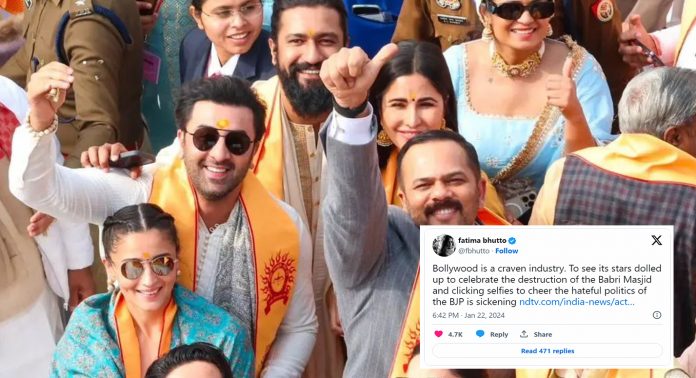At the consecration ceremony of the Ram temple in Ayodhya, Uttar Pradesh, a large number of Bollywood stars, including Amitabh Bachchan, Chiranjeevi, Alia Bhatt-Ranbir Kapoor, Vicky Kaushal-Katrina Kaif, and many more, were in attendance. Notable film industry leaders, including Rohit Shetty, Rajkumar Hirani, Ayushmann Khurrana, Madhuri Dixit Nene, and producer Mahaveer Jain, were present at the event, which generated both positive and negative comments.
On the other hand, writer Fatima Bhutto voiced her disdain for the star-studded event on social media. She slammed Bollywood as a “craven industry” and slammed the celebrities for endorsing the BJP’s “hateful politics” and celebrating the destruction of the Babri Masjid, sharing an NDTV report about their attendance.
A craven industry is Bollywood. Fatima Bhutto commented on the microblogging platform formerly known as Twitter that it is nauseating to see its stars dressed up to commemorate the collapse of the Babri Masjid and taking pictures to praise the BJP’s nasty politics.
Per NDTV, other attendees included Hema Malini, Pawan Kalyan, Shankar Mahadevan, Madhur Bhandarkar, Subhash Ghai, Shefali Shah, Vipul Shah, Randeep Hooda, Lin Laishram, Aadinath Mangeshkar, Anu Malik, and Sonu Nigam. As the RRR star arrived at the event with his wife Surekha and son Ram Charan, the spotlight was on Chiranjeevi. A video message allowed even those who couldn’t make it—like Tiger Shroff and Akshay Kumar—to send their best wishes.
Celebrity endorsements have a significant impact on public opinion and conversation, as Fatima’s article on X poignantly reminds us. Her unfavorable statement exemplifies the power of celebrities to spread messages, whether they are positive or negative.
Here, she stresses the danger of abusing their position by highlighting the power celebrities have to bring people together or, more often, to further divide them, especially when linked to certain political ideas. This entire situation makes one think about the weight of fame and the risks of supporting political causes that promote bigotry and hatred.
At the consecration ceremony of the Ram temple in Ayodhya, Uttar Pradesh, a large number of Bollywood stars, including Amitabh Bachchan, Chiranjeevi, Alia Bhatt-Ranbir Kapoor, Vicky Kaushal-Katrina Kaif, and many more, were in attendance. Notable film industry leaders, including Rohit Shetty, Rajkumar Hirani, Ayushmann Khurrana, Madhuri Dixit Nene, and producer Mahaveer Jain, were present at the event, which generated both positive and negative comments.
On the other hand, writer Fatima Bhutto voiced her disdain for the star-studded event on social media. She slammed Bollywood as a “craven industry” and slammed the celebrities for endorsing the BJP’s “hateful politics” and celebrating the destruction of the Babri Masjid, sharing an NDTV report about their attendance.
A craven industry is Bollywood. Fatima Bhutto commented on the microblogging platform formerly known as Twitter that it is nauseating to see its stars dressed up to commemorate the collapse of the Babri Masjid and taking pictures to praise the BJP’s nasty politics.
Per NDTV, other attendees included Hema Malini, Pawan Kalyan, Shankar Mahadevan, Madhur Bhandarkar, Subhash Ghai, Shefali Shah, Vipul Shah, Randeep Hooda, Lin Laishram, Aadinath Mangeshkar, Anu Malik, and Sonu Nigam. As the RRR star arrived at the event with his wife Surekha and son Ram Charan, the spotlight was on Chiranjeevi. A video message allowed even those who couldn’t make it—like Tiger Shroff and Akshay Kumar—to send their best wishes.
Celebrity endorsements have a significant impact on public opinion and conversation, as Fatima’s article on X poignantly reminds us. Her unfavorable statement exemplifies the power of celebrities to spread messages, whether they are positive or negative.
Here, she stresses the danger of abusing their position by highlighting the power celebrities have to bring people together or, more often, to further divide them, especially when linked to certain political ideas. This entire situation makes one think about the weight of fame and the risks of supporting political causes that promote bigotry and hatred.
